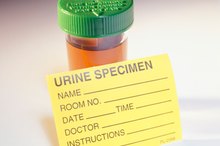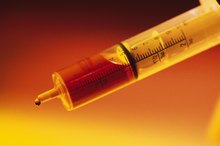Acceptable Creatinine Levels
Creatinine is included in most routine lab work because it is the most reliable indicator of kidney health 1. Kidney patients should know what creatinine is, how it is measured and what their creatinine values mean. Many patients find it helpful to maintain a spreadsheet of their creatinine levels. This data provides insight into how fast kidney disease is progressing.
If you are experiencing serious medical symptoms, seek emergency treatment immediately.
Definitions
Creatinine is a waste product produced by the muscles. It should not be confused with creatine. Creatine is found in muscles. When muscles work hard, they convert creatine into creatinine.
Both blood urea nitrogen, or BUN, and creatinine are nitrogenous wastes produced by the muscles. Unlike BUN, creatinine levels remain relatively stable in healthy people.
- Creatinine is a waste product produced by the muscles.
Units
Low Creatinine & BUN Counts
Learn More
Creatinine is measured in milligrams per deciliter (mg/dl) in the U.S. and in micromoles per liter (?/l) in Europe and Canada. Check what units are being used if a creatinine value seems impossibly high or low.
Multiply by 88.4 to convert between milligrams per deciliter to micromoles per liter. For example, a creatinine value of 0.6 mg/dl is equivalent to 53.04 ?/l.
Patients who change medical providers should not be surprised if their lab results edge up or down because there are slight variations in how labs measure creatinine 1. Such changes are normal.
- Creatinine is measured in milligrams per deciliter (mg/dl) in the U.S. and in micromoles per liter (?
- Patients who change medical providers should not be surprised if their lab results edge up or down because there are slight variations in how labs measure creatinine 1.
Normal Values
Men usually have higher creatinine values than women because they are more muscular. Similarly, adults have higher normal values than children.
According to the Family Practice Notebook, normal creatinine values for adult males are between 0.8 and 1.3 mg/dl. Normal values for women are between 0.6 and1.0 mg/dl. Normal values for children are lower. They depend upon the age and size of the child.
- Men usually have higher creatinine values than women because they are more muscular.
- According to the Family Practice Notebook, normal creatinine values for adult males are between 0.8 and 1.3 mg/dl.
Abnormal Results
Normal Creatinine Levels in Urine
Learn More
While there is no such thing as abnormally low creatinine levels, abnormally high levels can be symptomatic of many kidney disorders ranging from diabetes, glomerular disease, birth defects such as renal dysplasia and many other kidney diseases. If creatinine levels are abnormally high on repeated tests, additional diagnostic work will be necessary to determine the nature of the disorder 1. These tests might include urinalysis, ultrasound and kidney biopsy.
Warnings
Serum creatinine levels are different from urine creatinine levels. Urine creatinine levels are used to calculate other values such as protein creatinine ratios or calcium creatinine ratios. Urine creatinine levels should not be confused with serum creatinine levels because taken alone, urine levels are not indicators of disease.
If serum creatinine levels are not normal, it is important to get the test repeated before panicking. Many factors such as dehydration can throw off an otherwise normal value.
- Serum creatinine levels are different from urine creatinine levels.
- Urine creatinine levels should not be confused with serum creatinine levels because taken alone, urine levels are not indicators of disease.
Related Articles
References
- Lab Tests Online: Creatinine
- FamilyPracticeNotebook.com: Serum Creatinine
- National Kidney Foundation. Tests to Measure Kidney Function, Damage and Detect Abnormalities.
- National Kidney Foundation. Tests to Measure Kidney Function, Damage and Detect Abnormalities.
- Kildow BJ, Karas V, Howell E, et al. The Utility of Basic Metabolic Panel Tests After Total Joint Arthroplasty. J Arthroplasty. 2018;33(9):2752-2758. doi:10.1016/j.arth.2018.05.003
- National Institute of Diabetes and Digestive and Kidney Diseases. Glomerular Diseases. Updated April 2014.
- National Kidney Foundation. Acute Kidney Injury (AKI).
- National Kidney Foundation. 5 Drugs You May Need to Avoid or Adjust if You Have Kidney Disease.
- University of Rochester Medical Center. Creatinine (Blood).
- University of Rochester Medical Center. Creatinine Clearance.
Writer Bio
Shelly Morgan has been writing and editing for over 25 years for various medical and scientific publications. Although she began her professional career in pharmacological research, Morgan turned to patent law where she specialized in prosecuting patents for medical devices. She also writes about renal disease and hypertension for several nonprofits aimed at educating and supporting kidney patients.









